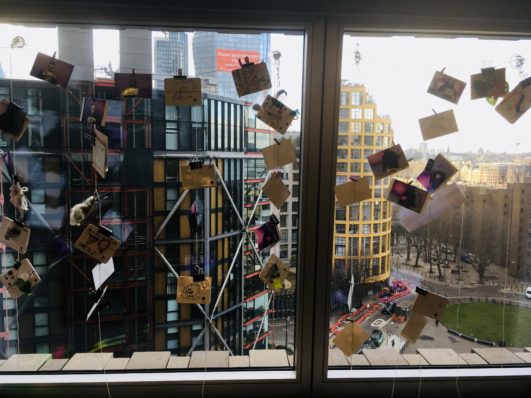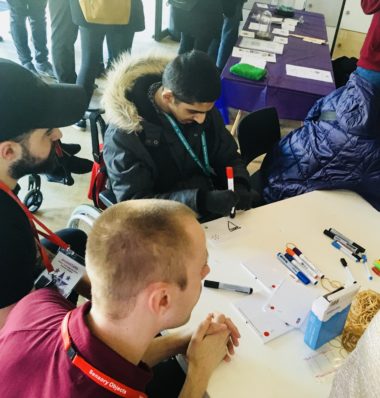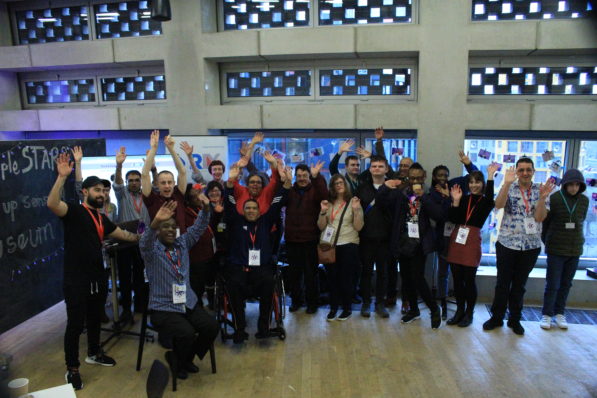
On the 24th and 26th of January this year, the PurpleSTARS mounted a ‘Pop-Up Museum’ at the Tate Modern to highlight the group’s innovative approach to making public culture more relevant and engaging for people with learning disabilities. The Pop-Up was featured as part of the Gallery’s Tate Exchange programme designed to provide educational experience themed around their Art Exhibitions.
Our Pop Up Museum was inspired by a show at the Tate Modern by the Kabakovs, celebrated artists from Russia who use different formats and materials to explore the relationship between art exhibits, their audiences and the authorities that commission art and influence what is deemed to be worthy of putting on public display. The PurpleSTARS were particularly inspired by an installation by Ilya Kabakov called ‘The Man Who Never Threw Anything Away’, made in 1996 and based on an imaginary character who had collected all of the ordinary items and rubbish he gathered throughout his life and then labelled and displayed them in his apartment. The Pop-Up Museum provided a way for visitors to the Kabakovs’ Tate Exhibition to rethink their own throw-away items in the same way, share their own stories of daily life and take part in a re-worked version of a public installation.
Visitors to the Pop-Up Museum were asked to donate a personal object to share any memories and stories associated with their contribution. The PurpleSTARS team guided visitors through the process, supporting and encouraging them to reflect on the sensory dimensions of both their objects and their memories. In this way the Pop Up Museum provided visitors with a cluster of multi-sensory experiences, making the Museum accessible for visitors of all ages and with different abilities. One visitor who created a display featuring pair of used theatre tickets with her mother said of her visit to the Pop-Up, “What a wonderful way to build a memory and story around an object I thought I had very little connection to. Awesome to sit with my Mum and make something together. Thank You”

The PurpleSTARS effectively co-curated their pop-up Museum on the spot at the Tate with its visitors. The team ran creative arts and media activity; using interactive postcards to make labels for the collection and interviewing visitors about their objects on video, running a photo shoot lit with purple light – and building a Sensory Pop-Up Museum Wiki on the spot with all the contributors.
On Friday, Judith, Rafaro and Kate from the Purple Stars delivered a ‘Ten Minute Tate Talk’ about the Pop-Up in front of Kabakov’s installation – making a piece of history as the first ever ‘Tate Talk’ to be delivered within a paying exhibition!
The Pop-Up Museum’s Wiki serves as a permanent Archive for the temporary Museum, providing a way to share the work of the PurpleSTARS more widely and inspiring other Exhibitions and Museums to consider adopting the creative approaches developed by our Enterprise to make their own collections more inclusive.
The ‘Pop Up Museum’ is to be one of a set of Training and Consultancy packages that the PurpleSTARS will offer UK Museums and Galleries when the Enterprise launches later this year. You can visit the PurpleSTARS website at www.purplestars.org.uk.

This project is the latest focus for the Rix Research & Media’s collaborative work with artists and technologists from Reading University and people with learning disabilities affiliated with Rix, who have developed skills and expertise in making public culture more inclusive. The PurpleSTARS sensory specialists are based at the Tower Project in East London and have been developing their professional service offer for Museums and Galleries with Rix as an inclusive enterprise in collaboration with Reading University and Tower’s Jobs, Enterprise and Training programme (JET). The project is supported by the Arts & Humanities Research Council as a Follow on Project for the three-year Sensory Objects Research Project that the partners completed in 2016.
